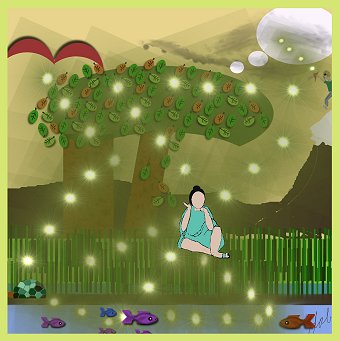A Secular Understanding of Dependent Arising: Table of Contents
 Americans seem to use “dependent origination” as the most common translation of paticca samuppada, but I don’t think we’re talking about “origination” so much as about what is arising, so I prefer “dependent arising”. (For the sake of search engines, I used “dependent origination” in the title of each blogpost, but a rose by any other name is still useful to learn about, right?)
Americans seem to use “dependent origination” as the most common translation of paticca samuppada, but I don’t think we’re talking about “origination” so much as about what is arising, so I prefer “dependent arising”. (For the sake of search engines, I used “dependent origination” in the title of each blogpost, but a rose by any other name is still useful to learn about, right?)
The Buddha says of the ignorance that begins this lesson, that it has no discoverable beginning. I take this to mean that in his view, it may have had an origin but it’s not one he could see from his perspective.
(AN 10.61:) “A first beginning of ignorance cannot be conceived, (of which it can be said), ‘Before that, there was no ignorance and it came to be after that.’ Though this is so, monks, yet a specific condition of ignorance can be conceived. Ignorance, too, has its nutriment, I declare; and it is not without a nutriment.– translated by Nyanaponika Thera
Nowadays science offers us some reasonable explanations of where the process began, which would have been in improvements in survival mechanisms over aeons. What arises in the process of dependent arising is a mechanism that has served our species well over the course of its evolution: the instinct to see ourselves as distinct and valuable individuals whose lives are worthy of preservation. This system has worked well in creating a creature who will defend itself and its ideas — for both of these (our bodies and our inventions) are key to the success of humankind. But it’s quite common for the things that serve us well to also have a dark side, and there is this about our tendency to self-protection: we perhaps take it a little too far. It seems that the instinct that served us well in our primitive days may not serve as well when applied to the increasing complexities of human interactions.
This series of posts is a *secular* understanding of dependent arising in the sense that it describes what’s going on in each link in terms of things we can see for ourselves — it is secular because it is confined to the here and now, the mundane, the pragmatic. The focus remains on what is happening in this life, and no reference is made to karma or rebirth.
A quick glance at the terms used for each link of dependent arising make it apparent that the Buddha was talking about a birth that follows a life described in terms of our actions (starting with contact with the world and what we feel in response to that contact) . Until fairly recently, it has been assumed that because the links were named with reference to rebirth, the only logical explanation was that what was being discussed was the fact of rebirth — and that paticca samuppada was effectively an endorsement of the Buddha’s belief in rebirth as the cosmic moral order. However, a new way of looking at the teaching recognizes that the Buddha used the structure of common concepts of the day about rebirth, to deny that what people thought was happening actually was, and to simultaneously point out what he saw was actually going on. This series focuses on the “actually going on” portion; the denial is not covered in these posts, but can be found in a paper called “Burning Yourself” recently published in the Journal of the Oxford Center for Buddhist Studies which can be found using a search like this one.
- Ignorance (avijja): Answers the question “Ignorance of what?”
- Sankhara: Why is this word so darned hard to translate?
- Consciousness/awareness (vinnana): Is liberation the end of consciousness? How could that be?
- Name-and-form/identification (namarupa): Is “namarupa” really the Buddha saying “We have this duality: mind and body”?
- Six Senses (salayatana): Sure, we have six senses. This is news?
- Contact (phassa): And our senses make contact with the world; why bother even mentioning this?
- Feeling/experience (vedana): Is liberation the end of feeling? Doesn’t that make it about disconnecting ourselves from life?
- Craving: (tanha) It is craving that is named as the cause of dukkha — craving for what, exactly?
- Clinging: (upadana) And then the next question is: clinging to what?
- Becoming: (bhava) A moment of transition between certainties and action.
- Birth: (jati) When we are looking for evidence of this “birth” in our own lives, where do we look to find it?
- Aging-and-death: (jaramarana) What is it about aging and death that’s the problem, exactly? Can we end these?
- The Taints: (asava) The chain of causation described in dependent arising is usually listed as twelve links, but it goes one step back further, with “the taints” being the cause of ignorance.
See also: Food and Fire in Dependent Origination (on the subject of the importance of understanding the term ‘nutriment’ because it is assumed to be understood in definitions of Dependent Arising).
